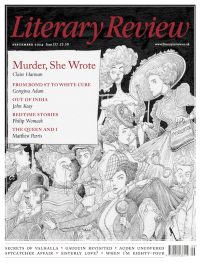Louis Rogers
Friends Reunited
Tell Me Everything
By Elizabeth Strout
Viking 330pp £16.99
Elizabeth Strout likes the way people glance off each other. In her ‘novel in stories’ Olive Kitteridge, which won a Pulitzer Prize in 2009, the titular character is constructed across thirteen stories, in which she ranges in status from protagonist to supporting character to cameo. Olive is an irascible maths teacher equally capable of spiteful cruelty and disarming kindness; she can work miracles for her former students but fails to relate to her own son. The different perspectives give us a rich but never authoritative (and sometimes contradictory) portrait of a person. The stories leap forward decades at a time, bypassing benchmarks like marriages, divorces and deaths. The intimation is that brief encounters can illuminate a person as much as long acquaintance.
The same effect is produced, on a larger scale, when characters reappear across Strout’s oeuvre. Anything is Possible (2017) and Olive, Again (2019) revived Lucy Barton – an Illinois-born, New York-based novelist – and Olive Kitteridge, and also featured characters from Strout’s other novels. Such reappearances can initially be distracting, but they achieve a cumulative force. There is no thinness or mere functionality to them: Strout has a strong feeling for the moment at which to present someone, typically at some distance from the landmark occasions of a life. Since the publication of Anything is Possible, she has written two more novels narrated by Lucy Barton, Oh William! (2021) and Lucy by the Sea (2022), which directly follow each other in chronology and depict a growing cast of familiar figures converging on towns in Maine.
Strout’s latest novel, Tell Me Everything, marks the logical end point of this journey, an Avengers Assemble of the Strout universe featuring not only Barton and Kitteridge and characters from their worlds but also protagonists from three other novels. The narrative picks up where Lucy by the Sea left

Sign Up to our newsletter
Receive free articles, highlights from the archive, news, details of prizes, and much more.@Lit_Review
Follow Literary Review on Twitter
Twitter Feed
Russia’s recent efforts to destabilise the Baltic states have increased enthusiasm for the EU in these places. With Euroscepticism growing in countries like France and Germany, @owenmatth wonders whether Europe’s salvation will come from its periphery.
Owen Matthews - Sea of Troubles
Owen Matthews: Sea of Troubles - Baltic: The Future of Europe by Oliver Moody
literaryreview.co.uk
Many laptop workers will find Vincenzo Latronico’s PERFECTION sends shivers of uncomfortable recognition down their spine. I wrote about why for @Lit_Review
https://literaryreview.co.uk/hashtag-living
An insightful review by @DanielB89913888 of In Covid’s Wake (Macedo & Lee, @PrincetonUPress).
Paraphrasing: left-leaning authors critique the Covid response using right-wing arguments. A fascinating read.
via @Lit_Review